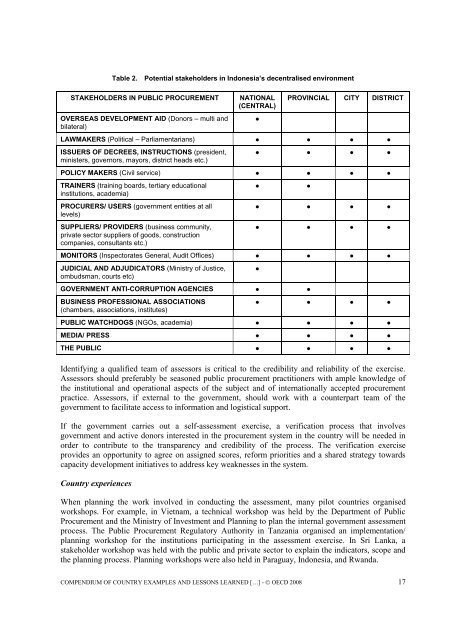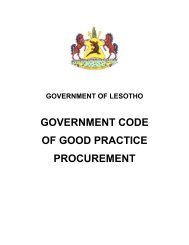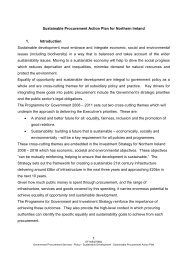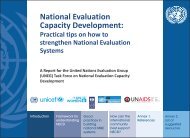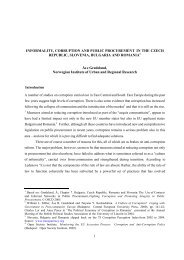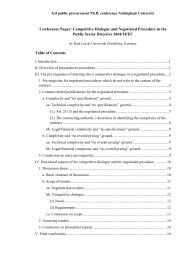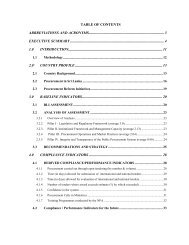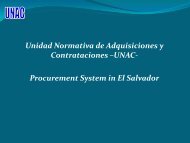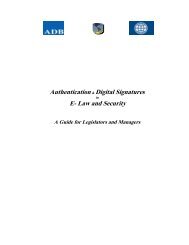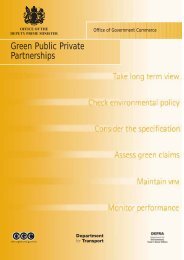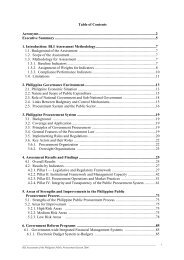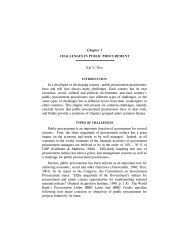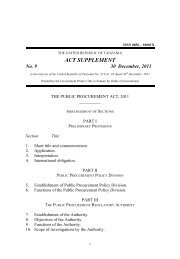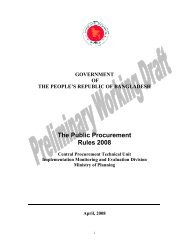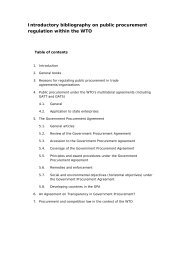Compendium of Country Examples and Lessons Learned from ...
Compendium of Country Examples and Lessons Learned from ...
Compendium of Country Examples and Lessons Learned from ...
Create successful ePaper yourself
Turn your PDF publications into a flip-book with our unique Google optimized e-Paper software.
Table 2. Potential stakeholders in Indonesia’s decentralised environmentSTAKEHOLDERS IN PUBLIC PROCUREMENTOVERSEAS DEVELOPMENT AID (Donors – multi <strong>and</strong>bilateral)NATIONAL(CENTRAL)PROVINCIAL CITY DISTRICTLAWMAKERS (Political – Parliamentarians) ● ● ● ●ISSUERS OF DECREES, INSTRUCTIONS (president,ministers, governors, mayors, district heads etc.)●● ● ● ●POLICY MAKERS (Civil service) ● ● ● ●TRAINERS (training boards, tertiary educationalinstitutions, academia)PROCURERS/ USERS (government entities at alllevels)SUPPLIERS/ PROVIDERS (business community,private sector suppliers <strong>of</strong> goods, constructioncompanies, consultants etc.)●●● ● ● ●● ● ● ●MONITORS (Inspectorates General, Audit Offices) ● ● ● ●JUDICIAL AND ADJUDICATORS (Ministry <strong>of</strong> Justice,ombudsman, courts etc)GOVERNMENT ANTI-CORRUPTION AGENCIES ● ●BUSINESS PROFESSIONAL ASSOCIATIONS(chambers, associations, institutes)●● ● ● ●PUBLIC WATCHDOGS (NGOs, academia) ● ● ● ●MEDIA/ PRESS ● ● ● ●THE PUBLIC ● ● ● ●Identifying a qualified team <strong>of</strong> assessors is critical to the credibility <strong>and</strong> reliability <strong>of</strong> the exercise.Assessors should preferably be seasoned public procurement practitioners with ample knowledge <strong>of</strong>the institutional <strong>and</strong> operational aspects <strong>of</strong> the subject <strong>and</strong> <strong>of</strong> internationally accepted procurementpractice. Assessors, if external to the government, should work with a counterpart team <strong>of</strong> thegovernment to facilitate access to information <strong>and</strong> logistical support.If the government carries out a self-assessment exercise, a verification process that involvesgovernment <strong>and</strong> active donors interested in the procurement system in the country will be needed inorder to contribute to the transparency <strong>and</strong> credibility <strong>of</strong> the process. The verification exerciseprovides an opportunity to agree on assigned scores, reform priorities <strong>and</strong> a shared strategy towardscapacity development initiatives to address key weaknesses in the system.<strong>Country</strong> experiencesWhen planning the work involved in conducting the assessment, many pilot countries organisedworkshops. For example, in Vietnam, a technical workshop was held by the Department <strong>of</strong> PublicProcurement <strong>and</strong> the Ministry <strong>of</strong> Investment <strong>and</strong> Planning to plan the internal government assessmentprocess. The Public Procurement Regulatory Authority in Tanzania organised an implementation/planning workshop for the institutions participating in the assessment exercise. In Sri Lanka, astakeholder workshop was held with the public <strong>and</strong> private sector to explain the indicators, scope <strong>and</strong>the planning process. Planning workshops were also held in Paraguay, Indonesia, <strong>and</strong> Rw<strong>and</strong>a.COMPENDIUM OF COUNTRY EXAMPLES AND LESSONS LEARNED […] - OECD 2008 17


